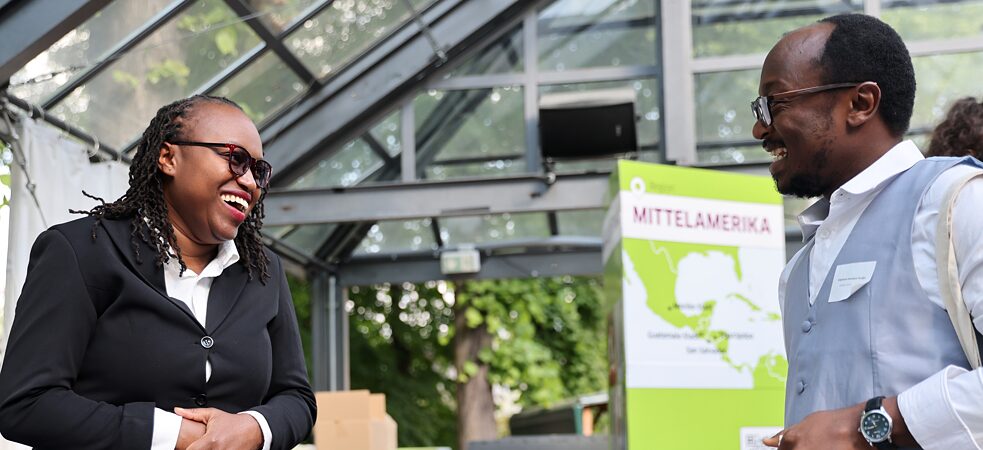Building Bridges for Successful Migration

Germany relies on qualified immigration as a key to economic sustainability. International professionals bring valuable skills and fresh perspectives that are urgently needed by companies in Germany. At the same time, migration remains a central topic in social and political discourse – offering an opportunity to actively shape conversations about openness, integration, and shared development.
The Goethe-Institut’s project “Pre-Integration and Transition Management – Successfully Shaping the Migration Process” demonstrates how this can be achieved. The project’s services are tailored closely to individuals and address the needs of those who come to Germany to live and work.
By Emrike Knoche
The shortage of skilled workers is one of the greatest challenges of our time: according to a study by the Institute for Employment Research (IAB), 84 percent of companies in Germany are currently affected – particularly in industrial and service sectors such as construction and hospitality. This shortage spans all qualification levels, from highly qualified experts to skilled workers with medium-level education. A similar alarming trend is seen across Europe: over 70 percent of EU companies cite the lack of skilled labor as the biggest barrier to investment. Attracting and integrating international professionals is therefore a top priority for both politics and business.
Germany depends on migration more than ever before. The coalition agreement of the new government formed by the CDU/CSU and SPD states: “Securing the skilled labor base is a key factor for the economic success of our country. That’s why we’re pulling out all the stops to ensure successful skilled labor immigration in the coming years.” In an increasingly globalized world, Germany is growing in importance as a country of immigration. Already, one in three families in the country has a migration background – a sign of the diversity and potential of our society. At the same time, migration is hotly debated in the public sphere. This makes it all the more important to engage in nuanced and solution-oriented dialogue. While countries like Japan and South Korea are actively recruiting professionals, and cities like Dubai or Doha aggressively seek out talent, Germany has the opportunity to set itself apart with clear and supportive structures. A forward-looking, open immigration policy is not only an economic necessity but also a reflection of social strength.
The Goethe-Institut makes an important contribution in this regard. Since 2022, with its project “Pre-Integration and Transition Management – Ensuring a Successful Migration Process,” co-financed by the Asylum, Migration and Integration Fund (AMIF) of the European Union, it has supported approximately 90,000 people from third countries who migrate to Germany for work or family reasons. The project prepares them for everyday and working life in Germany and supports their integration. At 61 locations worldwide, participants receive training in language, cultural awareness, and everyday life skills. The program is guided by principles such as empowerment, cultural sensitivity, realistic portrayals of life in Germany, and expectation management. Through welcome coaches and the multilingual web portal “Mein Weg nach Deutschland”, people are supported during their transition and early phase of settling in. Additionally, the Goethe-Institut has established 50 Info Houses across Germany, especially in small towns and rural areas, where newcomers can learn about life and work in Germany, practice German, explore local resources, and connect with others. A follow-up project to “Pre-Integration and Transition Management” is already being planned. It will extend to new countries of origin such as Uzbekistan, Pakistan, and Bangladesh. Based on the current project evaluation, processes and formats are to be optimized and standardized where possible under the project’s principles. Teacher training in regular language courses will also be expanded, with a focus on the project’s content and target groups. This is due to the important role teachers play as multipliers and their potential to deepen their understanding of the specific needs of migrants.
To fully realize its potential, the project depends on collaboration with numerous partners, ideally in seamless cooperation with the Goethe-Institut’s efforts. This is already being successfully implemented in many locations. Migrant organizations at the federal level and partnerships with network players such as foreign chambers of commerce, embassies, welcome centers, and the Centers for Migration and Development of the German Agency for International Cooperation (GIZ) abroad play a crucial role. They are not only points of contact but also bridge-builders within communities.
To ensure the long-term effectiveness of the project, clear recommendations have been outlined: increase involvement of partner institutions, tailor services even more specifically to target groups, and focus more on practical training, such as application procedures. At the same time, expectation management must be further developed – particularly around topics like living costs, housing, or access to daycare. One thing is clear: successful migration requires reliability, trust, and the will to build bridges – long before anyone even arrives.